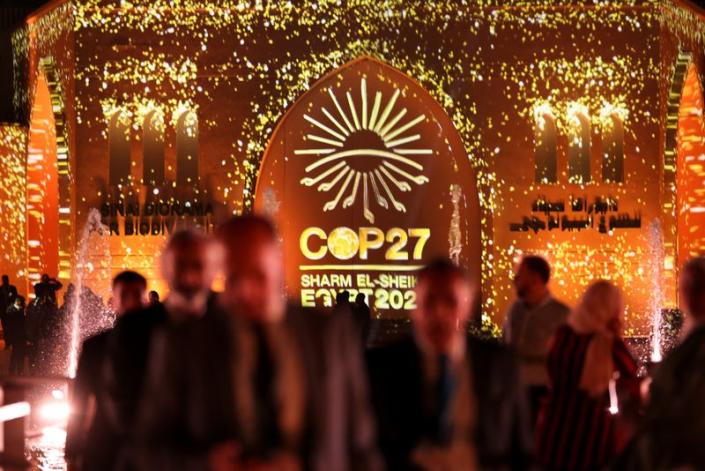The UN climate agency published a first draft on Thursday of what could be the over-arching agreement from the COP27 climate summit.
The document – labelled a “non-paper” indicating it is still far from the final version – repeats the goal from last year’s Glasgow Climate Pact “to accelerate measures towards the phase down of unabated coal power and phase out and rationalize inefficient fossil fuel subsidies.”
The Egyptian COP27 Presidency on Monday night released a two-page sketch of what could become a deal, featuring bullet points outlining many of the issues countries have asked be included – some of which have deeply divided nations.
Calls for Phase Down of All Fossil Fuels
At this stage, the UN document does not call for a phase down of all fossil fuels, as India and the European Union have requested.
The United States also signalled its support for language calling for a phasing down the use of all fossil fuels — which observers have said is a major symbolic shift because the US is the world’s largest oil and gas producer.
But the US said it only supports the phaseout of “unabated” fossil fuels, which are those burned without technology to capture the carbon dioxide emissions at the smokestack.
And inclusion of such an amendment would only be symbolic and would not have any enforcement mechanism, observers said.
Like the Glasgow Climate Pact, it would just call for participating countries to pursue a goal of limiting global warming to 1.5C, so the goal of phasing down fossil fuel use would just be aspirational.
India, the world’s second-biggest buyer of coal, wants countries to agree to phase down all fossil fuels at the climate summit, rather than a narrower deal to phase down coal that was agreed at COP26 last year.
Europe’s support for the move comes even as the EU ramps up its quest for coal and natural gas in the near-term to counter an energy supply crunch triggered by high demand and supply disruptions since Russia’s invasion of Ukraine.
The proposal could benefit India by easing the global focus on its coal use, but is also likely to face stiff opposition from developing countries with rich oil and gas deposits that want to avoid language limiting their use.
African States Oppose Phase Down Call
Currently, African nations oppose the broad call for a phase down of use of all fossil fuels, unless it is couched in clear terms they are prepared to endorse.
“We have come out strongly to indicate that we should be facilitated to sustainably explore our oil and gas resources,” Irene Batebe, permanent secretary at Uganda’s energy ministry, said.
“For us, and that’s the African Union’s position, we wouldn’t be pushing for a phase down, unless the phase down is clearly defined, because many of us are discovering new resources,” Batebe said.
Saudi energy ministry official and COP27 negotiator, Khalid Abuleif, said his country, the Organization of the Petroleum Exporting Countries’ biggest producer, was worried the final talks would “demonise” the fossil fuel industry.
Gas Projects Different to Oil, Coal: EU
The EU’s climate chief Frans Timmermans said the EU was not seeking to dictate a country’s investment plan but wanted to send a warning on investing in fossil fuels.
“I’m not telling African countries not to invest in fossils, let me be very clear about that. I’m just telling them ‘be careful what you do’ because if you invest in coal now, you’re sure to create stranded assets. If you invest in oil, you’re probably going to create stranded assets,” he said.
He said natural gas “is a different situation for which I have some understanding, especially if you combine that with infrastructure that is pre-fitted to also carry gases with other densities, such as green hydrogen or green ammonia in the future.”
Natural gas burns cleaner than coal, but drilling it and getting it to market often leads to leaks of methane, a powerful greenhouse gas.
ALSO SEE:
UK Blocks Chinese Takeover of Microchip Factory in Wales
Loss & Damage Fund
Meanwhile, the text does not include details – yet – for launching a fund for loss and damage, a key demand from the most climate vulnerable countries like island nations.
Rather, it “welcomes” the fact that parties have agreed for the first time to include “matters related to funding arrangements responding to loss and damage” on the summit agenda.
It does not include a timeline for deciding on whether a separate fund should be created or what it should look like, giving time for negotiators to continue to working on the contentious topic.
The document “stresses the importance of exerting all efforts at all levels to achieve the Paris Agreement temperature goal of holding the increase in the global average temperature to well below 2°C above pre-industrial levels and pursuing efforts to limit the temperature increase to 1.5°C above pre-industrial levels.”
The document is based on requests that delegates from nearly 200 countries have sought to be included in the final deal. It will provide a basis for negotiations over the coming days that are likely to substantially flesh out and rework the text.
- Reuters with additional editing by Jim Pollard
ALSO SEE:
China Seeks Better Adaptation to Climate Change As Risks Rise
China, Malaysia Seen Among States at Worst Risk of Climate Defaults
Climate change: Nine reasons why COP26 needs to work
























